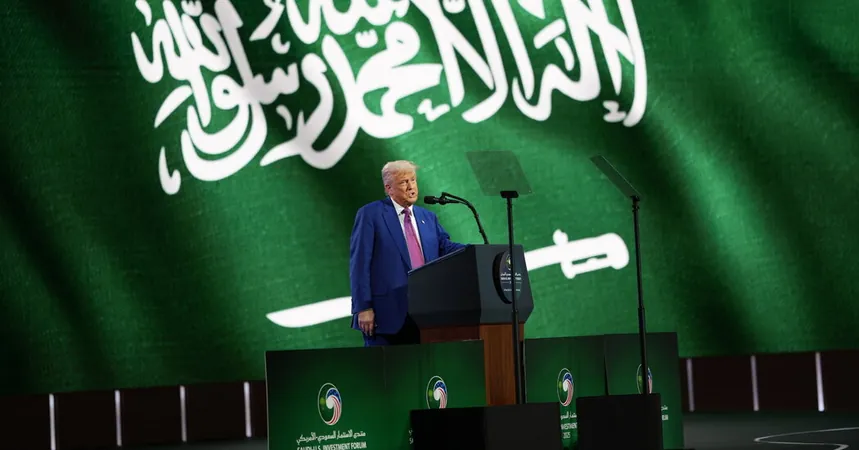
Trump’s Bold New Stance: No More Lectures on How to Live in the Middle East!
2025-05-15
Author: Ting
In a striking declaration at an opulent Saudi Arabian ballroom, President Trump announced a major shift in U.S. foreign policy—a departure from decades of interventionism in the Middle East. His message? The United States is done with nation-building and won't be offering 'lectures on how to live' any longer. This proclamation resonated deeply with an audience long fed up with American meddling.
During his sweeping address at an investment summit in Riyadh, Trump boldly stated, "The so-called nation builders wrecked far more nations than they built," emphasizing that the intricacies of local societies were often misjudged by foreign powers. He urged Middle Eastern nations to chart their destinies in ways that reflect their own values.
The echoes of his speech spread rapidly across the region, resonating in a landscape scarred by the U.S. invasions of Iraq and Afghanistan and, more recently, its support for Israel amid escalating tensions in Gaza. Trump's remarks come at the start of a four-day visit through Saudi Arabia, Qatar, and the UAE, primarily focused on lucrative business deals, including over $1 trillion in U.S. investments promised by the Gulf states.
Yet, Trump’s ambitions were more than financial; he expressed a fervent hope for Saudi Arabia to recognize Israel, following the steps of the UAE and Bahrain—though Saudi officials maintain that recognition hinges on a Palestinian state. Trump also expressed a desire for a new deal with Iran regarding its nuclear program, asserting, "I never believed in having permanent enemies."
In an unexpected twist, Trump met with Ahmed al-Shara, the new leader of a Syrian rebel alliance, posing for photos that surprised many in the region. While he praised the heritage of Saudi Arabia, he notably sidestepped past derogatory remarks about Islam, instead lauding Crown Prince Mohammed bin Salman as 'an incredible man'—a stark contrast to President Biden’s cooler rapport.
Trump chastised previous American leaders for attempting to 'look into the souls’ of foreign leaders and impose justice—which he argues has only created further conflict. Amid the applause, some critics noted his failure to address human rights violations, like those faced by American-Saudi Ibrahim Almadi, whose father was detained over social media posts.
Despite the controversy, Trump received a standing ovation, with Saudi officials calling his speech a landmark moment for partnership. However, critics argue it was a mere PR stunt benefiting the Saudi regime, questioning the sincerity of Trump's words while surrounded by foreign billionaires and authoritarian leaders.
Some analysts viewed Trump’s comments as reflecting a surprising alignment with leftist anti-imperialist perspectives, suggesting that right-wing movements have begun co-opting this rhetoric to further conservative agendas. Yet, skeptics remain, emphasizing that U.S. interests still take precedence over ethical considerations.
As the dust settles, the world watches intently to see how this new approach translates into real diplomatic actions in the complex tapestry of Middle Eastern politics.

 Brasil (PT)
Brasil (PT)
 Canada (EN)
Canada (EN)
 Chile (ES)
Chile (ES)
 Česko (CS)
Česko (CS)
 대한민국 (KO)
대한민국 (KO)
 España (ES)
España (ES)
 France (FR)
France (FR)
 Hong Kong (EN)
Hong Kong (EN)
 Italia (IT)
Italia (IT)
 日本 (JA)
日本 (JA)
 Magyarország (HU)
Magyarország (HU)
 Norge (NO)
Norge (NO)
 Polska (PL)
Polska (PL)
 Schweiz (DE)
Schweiz (DE)
 Singapore (EN)
Singapore (EN)
 Sverige (SV)
Sverige (SV)
 Suomi (FI)
Suomi (FI)
 Türkiye (TR)
Türkiye (TR)
 الإمارات العربية المتحدة (AR)
الإمارات العربية المتحدة (AR)